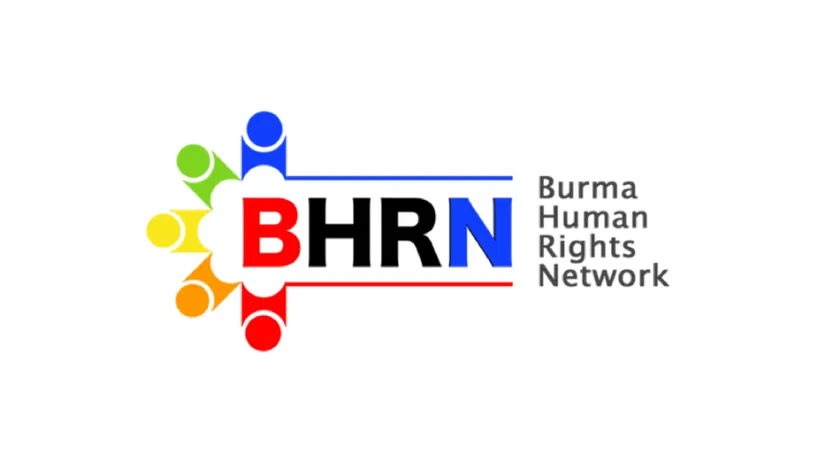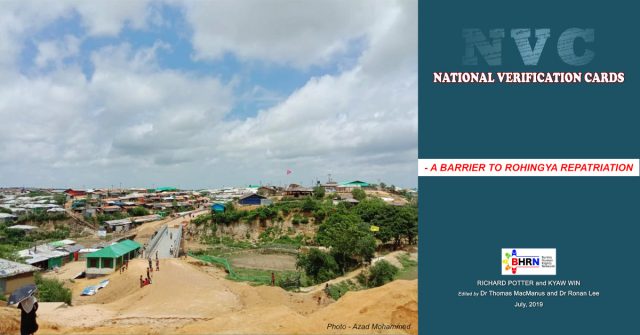Burma Human Rights Network Slams Myanmar’s Use of Nationality Verification Card for Rohingya
11 July 2019


National Verification Card – A Barrier to Rohingya Repatriation
The Burma Human Rights Network, in cooperation with Queen Mary University of London’s International State Crime Initiative, is proud to reveal its latest report, NVC: A Barrier To Rohingya Repatriation focusing on Burma’s deeply troubling National Verification Card (NVC) process. The NVC is often portrayed as a stepping stone to citizenship for the Rohingya but BHRN believes this process to further marginalize the Rohingya and that it ultimately enhances apartheid conditions in Rakhine State. BHRN disputes claims by the Burmese authorities that the NVC is being used as a stepping stone to citizenship for the Rohingya or that it has any useful purpose as a tool to verify the identities of returning refugees.
“Burma has convinced many in the world that the NVC process will help the Rohingya to become citizens and grant them greater rights in the country but this is clearly false. The NVC has been in use for years as a tool to identify Rohingya as foreigners and they have not received any greater rights as a result. The international community must not go along with Burma on this endeavor and should instead insist upon citizenship and full rights for the Rohingya,” said BHRN’s executive director, Kyaw Win.
For this report, BHRN interviewed 25 Rohingyas. In Bangladesh, BHRN interviewed 18 refugees, 5 from Buthidaung, 6 from Maungdaw and 7 from Ratheadaung about the extensive documentation the Burmese authorities have of Rohingya who lived in Northern Rakhine State since the 1990s as part of an annual survey conducted by authorities called “SweTinSit.” BHRN interviewed an additional 7 Rohingya currently living inside of Burma, both with and without National Verification Cards, about how the identification system has affected their day to day lives and the pressures they were under to accept them.
The SweTinSit survey demonstrates that Burma has extensive records of Rohingya living in the state prior to the mass exoduses of Rohingya fleeing genocidal campaigns by the Burmese Military in 2016 and 2017. These records negate the need for NVC to verify returning refugees as they contain extensive records of who is to return and what their original locations were. These records also detail births of Rohingya inside of Burma whose claims to citizenship should be unquestionable.
BHRN spoke with Rohingya currently living in Rakhine State about the NVC process and found all had complaints. Those interviewed said that authorities continued to exert pressure on Rohingya to accept the NVC, either with threats or denial of ‘incentives’. Fishermen in Sittwe were said to be required to have NVC in order to work, but still were only permitted to fish two days out of the week even while having NVC. NVC holders were eligible to apply for travel permits, but these requests were denied. NVC holders said they experienced no improvements in rights, opportunity, or quality of life as a result of holding NVC.
Burma appears to currently be using the NVC as a way to push back against pressure from the international community who want greater rights for the Rohingya, while also using it paradoxically as a tool to weaken the rights and status of the Rohingya in the long run. By forcing the NVC on the Rohingya they may find themselves permanently placed in the lowest tier of residency, confined indefinitely to squalid ‘temporary’ camps, and without any prospect for a just and prosperous future. Worryingly, the NVC has recently been forced onto some citizens belonging other marginalized communities as well, including Burmese Muslims who have long held higher tier citizenship status inside of Burma.
BHRN calls on the international community to use all appropriate tools at their disposal, including targeted sanctions and economic pressure, to reject the NVC process and insist upon a one which will grant citizenship for all Rohingya who voluntarily return to Burma and will grant them full rights. BHRN insists that Burma must end citizenship tiers in Burma which deny rights to minorities based on ethnicity and religion. BHRN strongly warns against efforts by the international community for repatriation which exclude the Rohingya from discussing their own fate.
Background on the Burma Human Rights Network (BHRN)
Burma Human Rights Network (BHRN) is working for human rights, minority rights and religious freedom in Burma. We are passionate about human rights for everyone in Burma, which is fundamental to the proper functioning of a democratic society.
BHRN has been advocating international community for Burma human rights situation since 2012. We play a crucial role advocating for human rights and religious freedom with politicians and world leaders and we have earned a reputation for providing credible and reliable analysis.
Decision makers from the EU, UK, US, and UN turn towards us to provide them with reliable analysis about hate speech, religious freedom and minority rights in Burma. BHRN also provides training about how to document human rights abuses.
Download full report here.
၎
င
၎
၎
Announcements
28 February 2025
Asian NGO Network on National Human Rights Institutions , CSO Working Group on Independent National Human Rights Institution (Burma/Myanmar)
Open letter: Removal of the membership of the dis-accredited Myanmar National Human Rights Commission from the Southeast Asia National Human Rights Institution Forum

Progressive Voice is a participatory rights-based policy research and advocacy organization rooted in civil society, that maintains strong networks and relationships with grassroots organizations and community-based organizations throughout Myanmar. It acts as a bridge to the international community and international policymakers by amplifying voices from the ground, and advocating for a rights-based policy narrative.